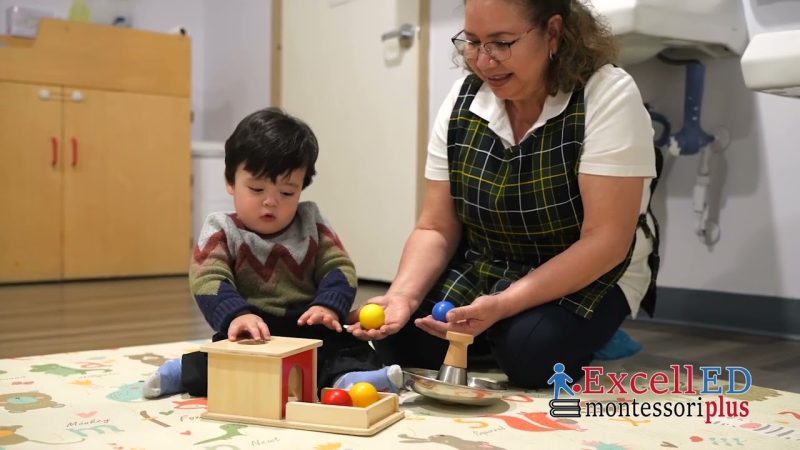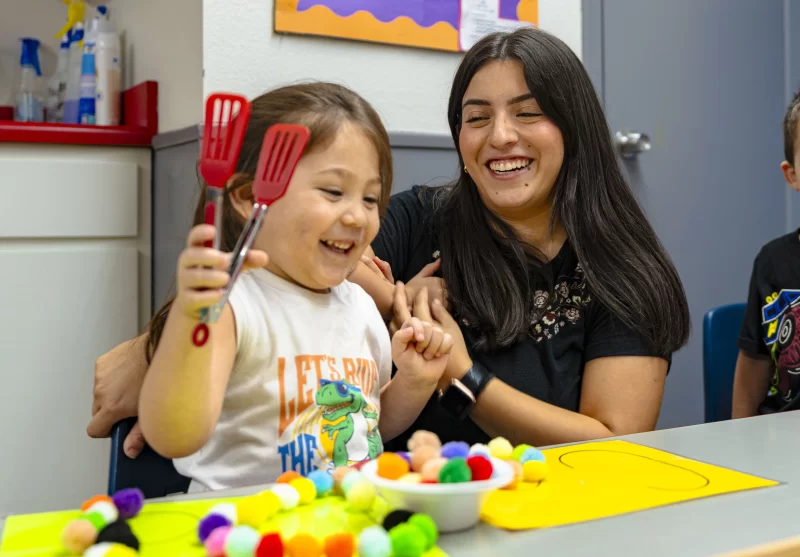
Have you ever thought that your child is being irrational, obsessive, compulsive, unreasonable or overly sensitive? Have you noticed your child showing an intense desire for specific activities and behaving highly sensitive when interrupted during these moments? Don’t worry; your child is probably transitioning through a sensitive period, and there is nothing to be concerned about.
Thankfully, Montessori shed some light on the matter as she observed universal childhood behavior patterns, which indicated that children move through sensitive periods where they acquire specific skills. She coined these heightened periods of awareness the Sensitive Periods. Montessori noted six main ones: the sensitive period for language, small objects, movement, refinement of the senses, order, and social behaviors.
Recognizing these sensitive periods will bring great understanding to your journey as a parent or carer as your child’s behavior during a sensitive period can often show up as obsessive or compulsive. Additionally, a child may have a powerful emotional response when disrupted or misunderstood during a sensitive period.
Sensitive periods and how best to support your child through each one
The sensitive period for language
In utero, a child begins absorbing the language he hears around him. Newborn babies can already differentiate between native and foreign languages; however, in Montessori’s time before neuroscience, she observed that from birth until around the age of six, children move through a sensitive period for language. During this phase, a child can easily acquire multiple languages and is particularly in tune with the absorption of vocabulary and interest in writing and reading.

Here are some ways to support your child during this time;
- Come down to your child’s level and look into their eyes when you speak, which allows your child to mimic your mouth movements as it creates the sounds.
- Expose your child to multiple languages. If you are fortunate to have native language speakers in your close circle, ask them to speak only that language to your child.
- If your toddler points to something, instead of saying, ‘Do you want this?’ Give them the vocabulary they seek and say, ‘would you like me to pass you the small milk jug? Would you like a pink mug too?
- Allow your child to repeat words and sings songs repeatedly. As annoying as it can be, try and encourage their enjoyment and play with words.
- Instead of jumping in to finish your child’s sentences, try and allow some more time for your child to find the words to express himself.
- Expose your child to language in many different forms through poems, songs, listening tapes, books, and loving conversation.
- Please encourage your child to write freely before reading and try not to correct their work.
The sensitive period for small objects
During this phase, between the years of one to four, your child may spend extended periods scrutinizing every tiny detail around him. Of course, in our fast-paced lives, this can be highly frustrating; however, your child is taking in the micro world so that later on in his adult life, he will understand the macro much more clearly. He is undertaking an important process!

Here are some ways to support your child during this time;
- Allow time for your child to take in every detail around him. Please slow down; it’s good for your nervous system too!
- Provide your child with safe and interesting objects to explore. Natural items such as pine cones expose your child to the Fibonacci sequence. Edible flowers are a vibrant and beautiful option, especially if your child is at that stage of putting everything in their mouth. Sea sponges, shells or interesting travel souvenirs make lovely items to explore.
- Charity shops are full of antique objects. Anything with opening doors or drawers is fantastic for your child to understand design mechanics.
- A drawer full of small animal objects is fun and especially good when combined with a set of wooden blocks—much open-ended creation and play are born from this combination.
The sensitive period for movement
During this period, from birth to the age of four, your child focuses on developing gross and fine motor skills. You may find your child going up and down the slide countless times and acting out when it’s time to leave. You may also notice your child repeating certain activities such as making a paper airplane for weeks or showing a particular fascination for a skill such as cutting.

Here are some ways to support your child during this time;
- Please allow your child to obsess about whatever activity he is into as he is mastering this particular skill.
- Give your child ample opportunity to move his body. Spend lots of time outdoors where your child can freely play and climb trees.
- Take your child to dance classes or join a sports club.
- Please encourage your child to use his hands as much as possible. Arts and crafts are great for this, such as drawing, painting, woodwork, knitting, stickers, cutting, and so much more!
The sensitive period for refinement of senses
During this time, your child is particularly interested in their senses. They are acutely aware of their input through the five senses of touch, sight, sound, taste, and smell and learn best during this time when their senses are engaged in the process. This period is most prevalent from birth to five years of age.
Oxytocin (the love hormone)

Here are some ways to support your child during this time;
- Play eye spy
- Go for a lovely walk and smell all the scented flowers along the way.
- Give your child different textured fabrics for their craft projects.
- Experiment with different meals, and introduce them to the flavors of different cultures, such as Thai, Indian, Chinese, etc.
- Listen to the birds outside and see if you can identify their calls.
The sensitive period for social skills
Children are particularly interested in social relationships from about two and a half to five. Group dynamics and cooperative play are of utmost interest, and you may find your child asking for many play dates or sleepovers during this time – friendships are most important at this stage!

Here are some ways to support your child during this time;
- Organize lots of social get-togethers with their friends.
- Teach your child socially acceptable manners such as please, thank you, respect for others, and how to be a good friend.
- Encourage teamwork so your child can learn to work cooperatively.
- Role model positive social behavior.
The sensitive period for order
Order is essential to a child from birth until about five, particularly around two, when this sensitive period peaks. This phase can be disturbing for a child if his world lacks structure. You may find your child acting up if his morning routine goes astray, he can’t find the specific jacket he wants, or if his environment is confusing, disordered, and unpredictable. Your child may also order and group toys and items into sizes or categories.

Here are some ways to support your child during this time;
- Simplify and organize their living areas so they can easily find what they want.
- Give everything a place in your house. Make sure the rain umbrella lives in the same spot and is easily accessible.
- Group toys into categories; for example, separate balls, soft toys, wooden blocks, and Lego into boxes, label them and make sure they have a designated place in your child’s room so that he can find them when needed.
- Have a consistent routine.
- Create a routine visual poster and inform your child in advance if there are any changes to his routine to prepare him for the change.
Hopefully, by understanding their needs, you are better equipped to provide him with the space and materials he needs to learn, grow and thrive! Observe, respect, and support your child during these sensitive periods as it will bring a great sense of calm for you both. These periods are brief windows in time, so please do your best to protect and nurture your child’s development as they transition through these precious developmental stages.
Subscribe to Newsletter
Programs offered at ExcellED Montessori Plus include:
✔️Infants (10 Weeks – 18 Months)
✔️Toddlers (18 – 36 Months)
✔️Primary (3-6 Years)
✔️Kindergarten
✔️Mother’s Day Out
✔️Spanish Immersion / Dual Language
✔️After School Programs and Summer Camp (6 – 12 Years)
Music, Spanish, and Yoga are other programs included as part of the tuition.
Learn more about Inquiry-based Learning









